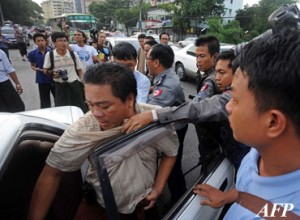3-9 December: Participation and Inclusion in Burma, Empty Words
December 10, 2012 Today, 10 December marks the United Nations’ Human Rights Day. This year’s theme is inclusion and the right to participate in public life, but these concepts are conspicuously absent in Burma today, as recent events have proved.
Today, 10 December marks the United Nations’ Human Rights Day. This year’s theme is inclusion and the right to participate in public life, but these concepts are conspicuously absent in Burma today, as recent events have proved.
The Office of the High Commissioner for Human Rights (OHCHR) identifies inclusion and the right to participate in public life as “essential elements in achieving the full range of human rights for all of us… the fulfillment of the right to participate is fundamental to the functioning of a democracy and an effective human rights protection system. When the right to participate and inclusion are respected, each and every one of us is offered the opportunity to join in the debate, to offer ideas and to campaign for change.”
To commemorate this day, Daw Aung San Suu Kyi joined the OHCHR’s event in Geneva as the keynote speaker via satellite, serving as both an advocate for participation in public life and an example of a person and a place where this right to participation was, and in many cases still is, absent. One of the largest challenges facing Burma today and in the future is whether the government is willing and able to provide this basic human right of inclusion and participation to all of its citizens.
The right to protest is an essential component of inclusion and participation in a democratic society. As the brutal crackdown and arrest of protesters at the Letpadaung copper mine in Monywa shows, Burma still has a long way to go in achieving these principles. Over 7,800 acres of land has been confiscated from villagers for the copper mine, but when they raised their voices to protest, the government responded with violence and arrests. On 29 November, riot police fired water cannons, tear gas and incendiary devices at protest camps in Letpadaung, injuring more than 60 monks, many with third degree burns. Police also arrested eight activists in Rangoon who organized protests against the mine and the crackdown.
There exists a clear dichotomy between what the United Nations accepts as inclusion and participation and what is happening in Burma today. The UN High Commissioner for Human Rights, Navi Pillay, in her statement to recognize Human Rights Day, echoes exactly the concerns and demands of the Letpadaung protesters:
“They are asking for an end to a situation where governments simply decide what is best for their populations without even consulting them. They are asking for their right to participate fully in the important decisions and policies affecting their daily lives, at the international, national and the local levels. Many people in many countries have been making it clear they are fed up with their leaders treating them with disdain and ignoring their needs, ambitions, fears and desires.
“They have been, in effect, asking for what has been, for more than sixty years, under international law, rightfully theirs.”
The concern in Burma is that there will continue to be more words and no action, talk but no concrete improvements. While statements regarding inclusion and participation are made, protesters are attacked and arrested. As legal reforms are vowed, ethnic conflict rages, homes are burned and citizenship is denied.
How can one fully participate in society when decisions are taken behind closed doors, when state institutions answer to business cronies rather than its electorate and when the judicial system is used to silence the population? How can one participate when living in a war zone, in a refugee camp, or in devastating poverty? How can one participate when saying ‘my land has been taken, hear my concerns’ is greeted with violence and arrest? It simply cannot. This year again, Burma is not a place to celebrate human rights but to censure human rights violations.
News Highlights
The 88 Generation Students urge the government not to arrest protesters who oppose the Letpadaung copper mine project however Rangoon protesters are denied bail
Kachin Independence Organization condemns the crackdown
Inside Burma
The government denounces Al Jazeera documentary, denies Rohingya genocide and claims Arakan State violence resulted from “underdevelopment” and a lack of international aid
Regional
Vietnamese President Truong Tan Sang concludes trip to Burma, pledges to increase bilateral trade
President Thein Sein postpones his state visit to Australia and New Zealand
International
Transparency International ranks Burma among the world’s most corrupt countries
UN urges aid for Kachin internally displaced persons in Kachin Independence Army controlled areas
Opinion
Keeping the Pressure on Burma’s Dictators
The Washington Post
Progress Stops at the Myanmar Elite’s Door
By Francis Wade
Al Jazeera
Latest from the Blog
Protests and Arrests Rise in November – Threatens Freedom of Expression
By Network for Human Rights Documentation – Burma
Violent Crackdown Against Buddhist Monks, New Regime with an Old Method
By Burma Partnership
Actions
Woman stages solo protest in Sittwe, Arakan State, against the crackdown on Buddhist monks and villagers protesting the Letpadaung copper mine; four activists, including a member of Generation Wave, protest in Rangoon as well as Buddhists monks
Statements and Press Releases
BURMA: Court Issues Landmark Ruling on Death in Police Custody
By Asian Human Rights Commission
BURMA: Former Activist Monk and Demonstrators Among Detainees in Wave of Arrests
By Asian Human Rights Commission
AAPP Condemns the Re-Arrest of Ashin Gambira (aka) Nyi Nyi Lwin
By Assistance Association for Political Prisoners – Burma
Free U Gambira! British Government Must Take Action
By Burma Campaign UK
Thein Sein Prosecution Raised In UK Parliament
By Burma Campaign UK
CSW Urges UK Minister to Prioritise Human Rights During Trade Mission to Burma
By Christian Solidarity Worldwide
Position Statement of KNU on Current Situation in the Country
By Karen National Union
This post is in: Weekly Highlights









 All posts
All posts